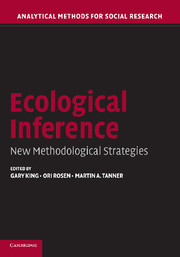Book contents
- Frontmatter
- Contents
- Contributors
- Preface
- INTRODUCTION
- PART ONE
- PART TWO
- 4 Extending King's Ecological Inference Model to Multiple Elections Using Markov Chain Monte Carlo
- 5 Ecological Regression and Ecological Inference
- 6 Using Prior Information to Aid Ecological Inference: A Bayesian Approach
- 7 An Information Theoretic Approach to Ecological Estimation and Inference
- 8 Ecological Panel Inference from Repeated Cross Sections
- PART THREE
- PART FOUR
- Index
7 - An Information Theoretic Approach to Ecological Estimation and Inference
Published online by Cambridge University Press: 18 May 2010
- Frontmatter
- Contents
- Contributors
- Preface
- INTRODUCTION
- PART ONE
- PART TWO
- 4 Extending King's Ecological Inference Model to Multiple Elections Using Markov Chain Monte Carlo
- 5 Ecological Regression and Ecological Inference
- 6 Using Prior Information to Aid Ecological Inference: A Bayesian Approach
- 7 An Information Theoretic Approach to Ecological Estimation and Inference
- 8 Ecological Panel Inference from Repeated Cross Sections
- PART THREE
- PART FOUR
- Index
Summary
ABSTRACT
The purpose of this chapter is to formulate and demonstrate information theoretic, moment-based approaches to processing and recovering information from aggregate voter data. In the context of the ecological inference problem, we focus on the recovery of unknown conditional vote counts for a precinct or district, given the observed number of votes for each candidate and the number of voters in demographic categories. The unknown and unobservable vote counts are interpreted as conditional probabilities of micro voting decisions. The problem of recovering the unknown probabilities from the macro data is initially formulated as an ill-posed or underdetermined inverse problem. The solution procedures are based on the Cressie–Read power-divergence criterion, and examples from the recent ecological inference literature are used to illustrate the characteristics of the estimators. In the second part of the chapter, we cast the information recovery problem in terms of a moment-based estimation problem and suggest solutions for recovering the unknown response parameters and corresponding marginal probabilities.
INTRODUCTION
In the social sciences, many of the data used for estimation and inference are available only in the form of averages or aggregate outcomes. Given this type of data restriction, researchers often use probabilities to represent information concerning the unknown and unobservable parameters of the underlying decision process. As a case in point, political scientists often face the question of how to process and recover information concerning voter behavior from precinct- or district-level data.
- Type
- Chapter
- Information
- Ecological InferenceNew Methodological Strategies, pp. 162 - 187Publisher: Cambridge University PressPrint publication year: 2004
- 8
- Cited by



